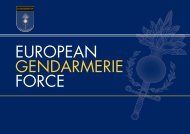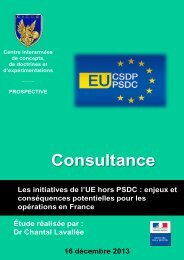Conference
science-research-bulletin-2013-conference
science-research-bulletin-2013-conference
You also want an ePaper? Increase the reach of your titles
YUMPU automatically turns print PDFs into web optimized ePapers that Google loves.
EUROPEAN POLICE SCIENCE AND RESEARCH BULLETIN<br />
SPECIAL CONFERENCE EDITION<br />
norms that have an impact on change processes<br />
(first snapshot results: Elliott, van den Oord,<br />
Pólós & Betteridge, 2013). This work package<br />
also addressed the following questions: What<br />
kind of change processes were implemented?<br />
Which ones were successful and which ones<br />
were not? What were the success factors and<br />
which factors contributed to failure?<br />
• WP 6 researches the organisational culture<br />
of police organisations and the professional<br />
identity of police officers in order to understand<br />
which parts of the specific police culture serve<br />
as facilitators for or barriers against change<br />
processes (first results: Horton, Bayerl &<br />
Jacobs, 2013; Bayerl, Horton & Jacobs, 2013a).<br />
• Finally, WP7 looks at the aspect of leadership<br />
in change processes (first results see: Bayerl,<br />
Horton & Jacobs, 2013b).<br />
The research process can be tracked via the<br />
project’s website (www.composite-project.eu)<br />
where working papers, publications, presentations,<br />
and general news on the COMPOSITE project are<br />
released. Information on the on-going project<br />
progress is also given in a monthly COMPOSITE<br />
newsletter.<br />
RESEARCH METHODS<br />
The COMPOSITE project uses a multi-method<br />
approach. Over the course of the project, several<br />
hundred semi-structured interviews (qualitative<br />
social research) with police officers of all hierarchical<br />
levels — operational, supervisory, strategic level<br />
— were carried out in the participating police<br />
forces. In WP 1, a PESTL analysis was conducted<br />
examining the topics of police policy in terms of<br />
political (P), economic (E), social (S), technological<br />
(T) and legal (L) trends. As part of WP 2, a SWOT<br />
analysis was conducted, giving valuable insights<br />
into the strengths and weaknesses of police<br />
organisations, as well as the opportunities and<br />
threats they are faced with. This research also<br />
focussed on the dynamic capabilities of the police<br />
forces involved. In most work packages, also a<br />
case study approach was used to describe specific<br />
change processes in greater detail. In addition<br />
to the semi-structured interviews and the case<br />
studies, a core survey (quantitative social research)<br />
was conducted in all countries in order to test<br />
the hypotheses that were formulated on the<br />
basis of the previously conducted interviews. The<br />
data was collected through an online and paperbased<br />
questionnaire distributed to the individual<br />
participants between September and October<br />
2013. At the time of writing (March 2014), the<br />
analysis of the assembled data was still going on.<br />
RESEARCH FINDINGS<br />
Police forces all over the world are constantly<br />
forced to change in order to react to political,<br />
social, technological, economic, legal and<br />
environmental developments (Van den<br />
Born & Witteloostuijn, 2011; Van den Born<br />
et al., 2013). Most of these changes do not<br />
encounter significant resistance nor do they<br />
run into any kind of significant problems.<br />
Examples of routine changes may include the<br />
introduction of more advanced technologies,<br />
legal changes, or procedural improvements. But<br />
some changes can create significant irritation<br />
among the members of the organisation<br />
or major stakeholders, trigger criticism and<br />
resistance and may not yield the desired results.<br />
Particularly, changes that do not take into<br />
account organisational, professional, or cultural<br />
parameters, often turn out to be risky and<br />
prone to failure (Jacobs, Christe-Zeyse, Keegan<br />
& Pólós, 2008). Therefore, COMPOSITE focuses<br />
on organisational structures, organisational<br />
identities and cultures, leadership styles, and<br />
processes in the context of change.<br />
In this respect, police forces to a large degree<br />
depend on their organisational environment.<br />
In order to be successful, police forces need<br />
to operate in networks and cooperate with<br />
different external stakeholders — municipal<br />
administrations; educational institutions;<br />
media; citizen; justice, to name but a few — in<br />
due consideration of their mutual expectations<br />
(cf. Gruschinske & Hirschmann, 2013, p.<br />
187). As part of WP 1 and 2, the stakeholder<br />
management of the participating police forces<br />
was examined with respect to how important of<br />
the stakeholder is for the police and what kind<br />
of influence the stakeholder has upon the police<br />
(Barlage, van den Born & Jochoms, 2012).<br />
There is strong evidence that in most police<br />
forces, there does not seem to exist a<br />
strategically oriented stakeholder management,<br />
meaning that many police organisations invest<br />
too much time and effort in stakeholders that<br />
are not particularly relevant for them, and at<br />
156





